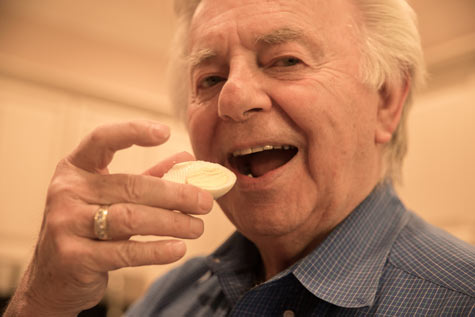
Protein benefits the aging body during times of stress.
Pass the cheese, please! Recent studies are showing the importance of a protein-rich diet for the elderly, notably during occasions of anxiety, for instance when fighting a chronic disease or acute illness, or preparing for a medical procedure or hospitalization, when protein is processed less effectively. And even when seniors are healthy, protein benefits the aging body by sustaining muscle strength and mass, healthy bones and more.
Nonetheless, as many as one-third of all older adults aren’t consuming sufficient levels of protein, for a variety of reasons, such as:
- Taste impairments
- Difficulties with swallowing
- Monetary limitations
- Decreased appetite
- Dental issues
And, the less active lifestyle that numerous older adults lead further compounds the adverse effects of too little protein consumption, including:
- Deteriorating mobility
- Decreased muscle mass and strength
- Lengthier recuperation times when ill
- Eventual loss in independence
Fortunately, people who do eat recommended amounts of protein are more likely to continue to maintain independent functionality with tasks like getting dressed and attending to other personal hygiene needs, walking, and climbing stairs. According to Wayne Campbell, professor of nutrition science at Purdue University, “While eating an adequate amount of protein is not going to prevent age-associated loss of muscle altogether, not eating enough protein can be an exacerbating factor that causes older adults to lose muscle faster.”
The research claims that protein should be acquired from natural food sources, versus via protein shakes. Suggested protein levels are generally .8 grams of protein per 2.2 pounds of body weight every day; so, for a 120-pound woman, that equates to 48 grams of protein/day. However, for anyone going through the stressors cited above, the guideline grows to 1.2 – 1.5 grams of protein per 2.2 pounds of body weight.
These protein-rich foods are fantastic options:
- Chicken (28 grams of protein per 3-ounce serving)
- Yogurt (18 grams of protein per 6-ounce serving)
- Cottage cheese (14 grams of protein per ½-cup serving)
- Lentils (9 grams of protein per cup)
- Milk (8 grams of protein per cup)
Naturally, remember to check with the older adult’s doctor before making any dietary modifications. Once a dietary plan is agreed upon, let Live Free Home Health Care assist by planning and cooking nutritious, appetizing meals, picking up food and ensuring the pantry and refrigerator are filled with wholesome meals and snack options, offering encouragement to maintain an engaged lifestyle, and so much more – all leading to better overall health.
Call us any time at 603-217-0149 to request free in-home consultation for more information on our experienced home care in Concord, NH and the surrounding areas.
